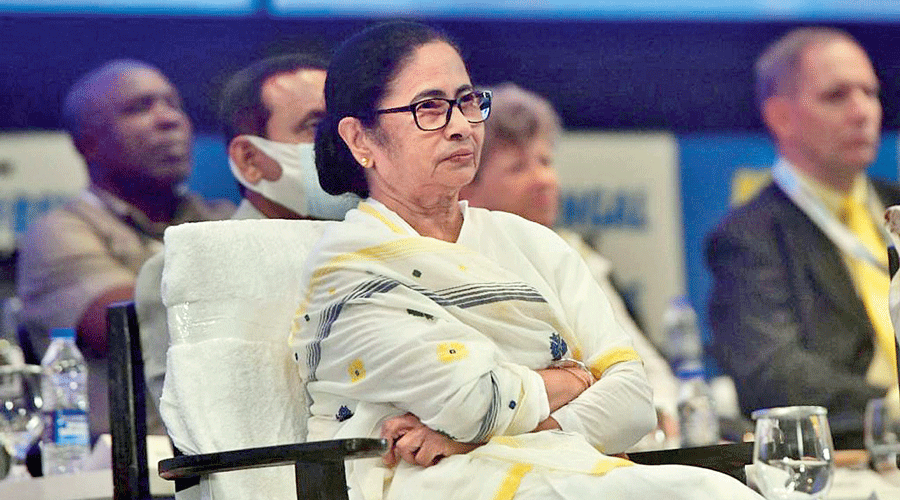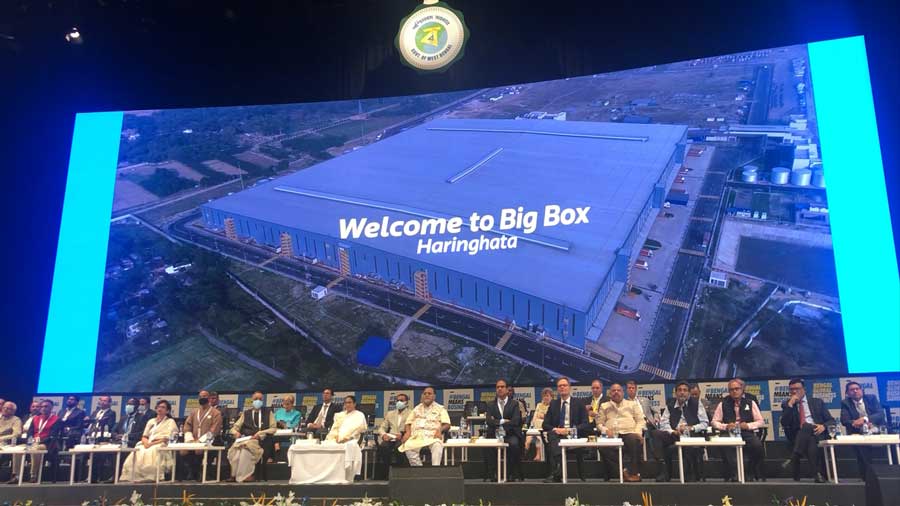Chief minister Mamata Banerjee on Thursday said that investment proposals worth Rs 342,375 crore had been received during the sixth edition of the Bengal Global Business Summit and around 40 lakh jobs would be created if these proposals — contained in 137 memorandums of understanding and letters of intent — materialised.
In her valedictory address, the chief minister rolled out the composite figure, collated by the industries department, related to proposals drawn by the summit, which she described as the most successful among the six that the state had organised till now.
“This is the most successful BGBS we have organised so far.… In the last five, we received around a total of Rs 12 lakh crore worth of investment proposals,” the chief minister said.
“In the last two days alone, we received investment proposals worth Rs 342,375 crore…. Should I repeat the number?” Mamata said.
The figure was presented to her by Amit Mitra, principal chief adviser to the chief minister and the finance department, and his team.
There’s little doubt that the numbers rolled out in the valedictory session would remain a topic of discussion over the next few months. Several Opposition leaders — such as CPM central committee member Sujan Chakraborty and BJP MLA and economist Ashok Lahiri — began questioning the chief minister’s claims within hours of the curtains coming down on BGBS 2022.
Such debates are not unique to Bengal. Opposition parties in states like Gujarat and Rajasthan, which too hold summits to draw investment, too tend to question the claims about the volume of investment proposals after each edition of the summits.
No one from the government or the ruling party locked horns with the Opposition over the investment-proposal figure till late Tuesday evening, but sources in the state government said a break-up of the proposals would be released soon.
While a break-up may help address the scepticism, the fact remains that proposals get implemented only when investors have confidence in the overall economic environment and faith in the leadership of the state where they are to pump in their money.
On her part, Mamata played the stability card in Bengal to try and convince the investors about her ability to control any situation in the state, besides parading a host of existing investors before the potential investors.
While the total count of investment proposals — a litmus test for any such summit — made Mamata happy, she was happier with the response that the summit, held after two years, attracted despite the pandemic.
“The kind of attendance and attention that the event got this time has been very satisfying.… When we were planning this year’s summit, some of us were very apprehensive. They said ‘no one will come’ but I said ‘let us do it’,” Mamata told this correspondent later in the day.
According to the official count, 4,300 participants, including 500 international delegates from 43 countries, took part in the two-day event, which included several parallel sessions focusing on various sectors like agri business, medium and small sector industries, services and power.
“So many people from different places came and held discussions.… I also met people personally and made requests in closed-door discussions to consider Bengal as their investment destination,” the chief minister said. She said she had urged an automobile major to consider investing in the state, and had sought more flight connectivity for Bengal at a meeting with the representative of an airline.
“This year, we got the chambers from the districts involved and it worked wonders,” she said.
That Bengal had hosted such a summit on a large scale in the middle of the pandemic — the chief minister didn’t hide her concern about the spike in infections in some parts of India during her discussions with aides — was the most important achievement for the summit, she said.
The next summit, likely between February 1 and 3 next year, is being planned to build on the interest this one has generated. “Because of Covid, we could not hold it for two years. We could not visit other countries, from where we could have got potential investors…. We intend to go abroad this September as part of preparations for the next summit,” the chief minister said.
Mamata, who came to power riding an anti-land-acquisition movement, has always spoken about the co-existence of industry and agriculture, but never before has she laid so much emphasis on industry, especially large-scale industries, which have eluded the state.
In several of her addresses, she said that Bengal’s success in creating an ecosystem for MSMEs had helped tackle the unemployment problem. But the claim has often been questioned.
“The chief minister realises that she needs to get some big-ticket investment, which will be visible, and help attract more companies.… Lack of employment opportunities for educated youth is indeed a problem in the state and the chief minister is trying to address that with her effort at bringing in big investments,” a senior state government official said.












